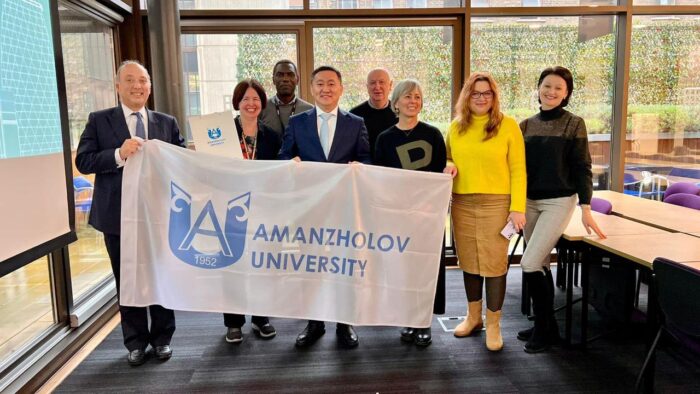ASTANA – Kazakh Minister of Science and Higher Education Sayasat Nurbek arrived on Jan. 25 in London to take part in the BETT UK 2024 international conference and meet with British colleagues to expand enduring cooperation between Kazakhstan and the United Kingdom, reported the ministry’s press service.

Amanzholov University and the University of Westminster signed the agreement. Photo credit: the ministry’s press service.
BETT is the world’s largest exhibition of educational technologies, bringing together not only leaders in the education sector from all corners of the globe but also gathering in one place over 600 innovative providers of educational technologies and resources, showcasing cutting-edge and effective products and services.
As part of the conference, Nurbek addressed the conference participants on the impact of artificial intelligence (AI) on higher education.

Sayasat Nurbek and CodiPlay team. Photo credit: Nurbek’s Facebook page.
The minister shared insights into the reforms being implemented in Kazakhstan regarding the integration of AI into the education program and discussed how the government is responding to the challenges posed by modern technologies.
He mentioned President Kassym-Jomart Tokayev’s directive given in the address to the nation in September last year to open three institutions for the study of AI in three domestic universities.
“We are actively working in this direction. AI is an objective reality that is increasingly penetrating all aspects of human life, and the higher education system is no exception. The development of AI in higher education brings not only advanced technologies but also changes in teaching and research methods,” said Nurbek.
In terms of learning processes, he noted it opens the doors to more interactive learning, where AI can adapt content to individual needs and learning pace. Along with that, it also contributes to the development of critical thinking.
There are also substantial benefits for educators, according to the minister.
“For teachers, AI becomes a powerful tool in research and administrative tasks. The automation of routine processes frees up time for deeper interaction with students, the creation of new courses, and scientific research,” he said.

Sayasat Nurbek addresses a session at the conference. Photo credit: Nurbek’s Facebook page.
Among the notable participants at the conference was Kazakhstan’s CodiPlay, an EdTech startup that has developed a comprehensive solution for schools. Their application, CodiPlay, introduces programming languages such as C++, Scratch, and Python through engaging arcade games.
The CodiKit sets empower students to create and program 56 Internet of Things projects, while CodiTeach provides a web platform to support teachers and monitor the learning process.
“As of today, schools in Kazakhstan, Uzbekistan, South Korea, Qatar, Azerbaijan, and Indonesia are connected to the system. Thanks to projects like CodiPlay, our education system will experience a significant leap in development,” wrote the minister in a social media post.
Kazakhstan and the United Kingdom have enjoyed an enduring partnership in education in more than 30 years of diplomatic relations.
As part of the BETT conference, Narxoz University in Kazakhstan and Queen’s University Belfast in the United Kingdom signed an agreement introducing a dual-degree program following the 2+2 model with the Russel Group league, a self-selected association of research-intensive universities in the United Kingdom.
The program is set to commence in the 2024-2025 academic year. It will include bachelor’s degrees in business administration in finance, management and economics.
Admissions criteria encompass GPA and IELTS scores, marking a significant step in fostering educational ties between the two nations.
In another notable achievement, Amanzholov East Kazakhstan University signed an agreement with the University of Westminster. This new partnership is meant to advance Kazakhstan’s science development, focusing on the commercialization of research projects in biomedicine, applied biotechnology, artificial intelligence in medicine, and genetic engineering.
“The partners have everything necessary for a progressive leap in these directions. For example, the university operates a student clinic with all the corresponding infrastructure: patient rooms, registration desks, and medical offices. I believe that our active interaction will be an innovative breakthrough for both sides,” said Amanzholov University Rector Mukhtar Tolegen.
The agreement will also facilitate master’s students in pursuing a dual-degree program. The students will study for one academic year at the Kazakh university and the second year at the University of Westminster.
On his visit, Sayasat Nurbek met with Maia Chankseliani, an associate professor of comparative and international education at the University of Oxford.
“During the negotiations, we discussed three important directions: the scientific internship program, consulting on academic centers of excellence, and consultations in the field of higher education policy,” wrote Nurbek in a social media post.
Nurbek was not alone on this trip. Не headed the delegation that included senior education officials.
A major highlight of the visit was the official presentation of the first Kazakh-English and English-Kazakh Oxford Dictionary at Oxford University. The inaugural edition of the Oxford Qazaq Dictionary encompasses over 60,000 words and spans 1,300 pages, with a print run of 10,000 copies.

